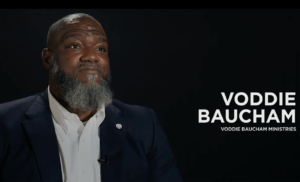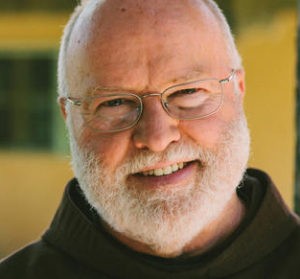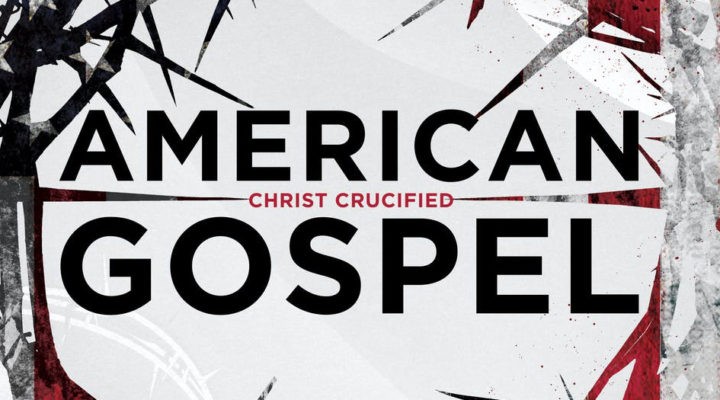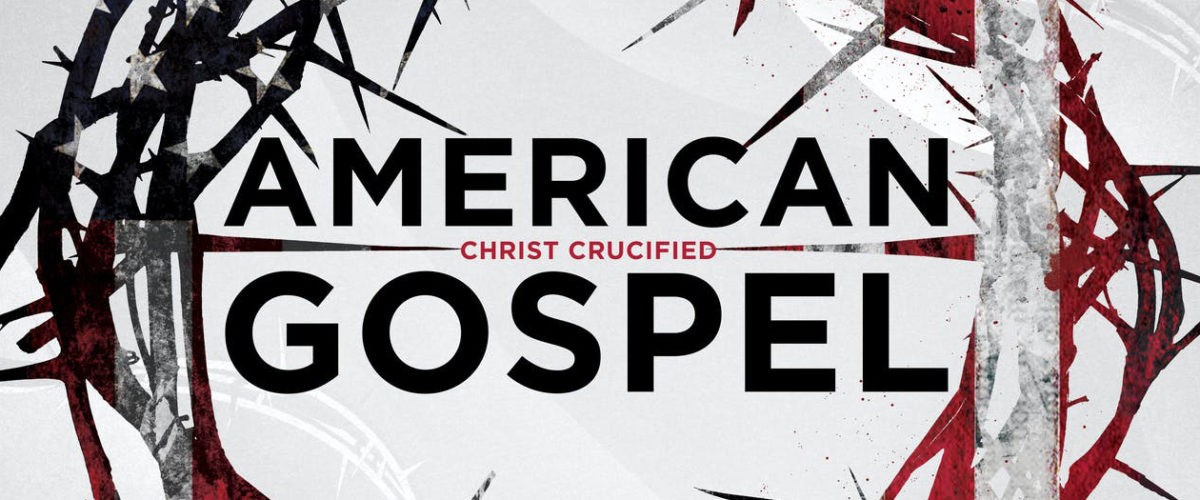Based on the heated responses I’ve received to my review of the first American Gospel: Christ Alone documentary, I began to realize I should review producer Brandon Kimber’s second film, American Gospel: Christ Crucified.
Kimber had read my first review and reached out to me, and despite our clear differences, our conversation was nice and I was thankful for his kind offer to screen the second film, especially since he knew I wouldn’t like it.

Brandon Kimber
That I wouldn’t like the documentary is not what bothered me over the past few months. It was that I knew this one would hurt more. While Kimber’s first documentary was against the prosperity gospel, which we both agree is dangerous and oppressive, this second documentary confronts progressive Christians including Rob Bell and Richard Rohr, two men who have been instrumental in my ongoing spiritual healing from the wounds that were shaped in me by the very theology that American Gospel promotes.
In reviewing this documentary, I would be doing more than simply reviewing something I disagreed with. I would be facing my wounds once again, while hearing that my healing was actually an embrace of death.
However, the ability to know and name my own faith story helped me better understand what I was watching and how to critique it.
What is this about?
American Gospel: Christ Crucified is a three-hour documentary produced by Transition Studios, an independent studio with a total of four films in its catalog so far. Its writer and director is Kimber.

Tony Jones, author of “Did God Kill Jesus?”
This film sets the preferred Calvinist theology of its producers against more progressive forms of Christianity, claiming for itself the label of “traditional” orthodoxy. It includes interviews with four progressives — Bart Campolo, Tony Jones, John Williamson and Adam Narloch — whose beliefs are described in publicity material as “outside of the bounds of historic Christianity.” More on that later.
The documentary takes its name from 1 Corinthians 1:23 — “But we preach Christ crucified, to Jews a stumbling block and to Gentiles foolishness.”
Its website explains: “The gospel message of ‘Christ crucified’ has always been offensive. In our culture it is common for preachers to soften the offense of the cross, and the attributes of God that are displayed in the person of work of Jesus Christ. American Gospel: Christ Crucified explores how the paths of post-modernism and progressive Christianity lead to a different gospel, and a god created in our own image.”
 Apologists for the film’s point of view who are shown include Voddie Baucham Jr., Alistair Begg, Alisa Childers, Mark Dever, Phil Johnson and John MacArthur.
Apologists for the film’s point of view who are shown include Voddie Baucham Jr., Alistair Begg, Alisa Childers, Mark Dever, Phil Johnson and John MacArthur.
Beginning with stories
American Gospel: Christ Crucified is ultimately a documentary about stories. It’s about the story of the cosmos leading to the story of Jesus that transforms our own stories. Fundamental to this story is that it be personal, historical, cosmic and actually good news.
American Gospel begins by contrasting two personal stories of faith. One man had been attracted to Christianity based on the feeling that corporate worship gave him, while the other man was attracted to Christianity by the Bible. You can guess which one’s faith remained, and which one’s vanished. The distinction is made clear.
And here is the first important point to unlock the documentary: According to American Gospel, there is a dichotomy between being led by one’s feelings and being led by an inerrant Bible.
“According to American Gospel, there is a dichotomy between being led by one’s feelings and being led by an inerrant Bible.”
The film goes hard after the stories of LGBTQ relationships as being driven by feelings rather than the Bible, and it says people who affirm LGBTQ relationships are simply doing so because of their feelings and because to condemn LGBTQ relationships is “culturally unpopular and frowned upon.”
Yet, there is no acknowledgement or confession of any abuse of the LGBTQ community by conservative Christians, or of alternative interpretations of the Bible. The film’s backers seem either totally unaware of the harm conservative Christians have caused — or unwilling to apologize for it.
They revisit the heartbreaking story from the first documentary of a woman who is experiencing great suffering. She acknowledges some of how she feels about her pain. But then she concludes: “It’s not about that. It’s about giving God glory.”
 Former Zoe Girl singer and current apologist Alisa Childers tells her story of experiencing some questions, listening to a pastor share his doubts, and wondering if the Bible is reliable for a season. Ultimately, she said, she found solutions that were satisfying enough to believe in inerrancy again.
Former Zoe Girl singer and current apologist Alisa Childers tells her story of experiencing some questions, listening to a pastor share his doubts, and wondering if the Bible is reliable for a season. Ultimately, she said, she found solutions that were satisfying enough to believe in inerrancy again.
In every personal story, the people behind American Gospel make clear that they are basing their own beliefs and decisions on the word of God and God’s glory, while those who disagree with them are basing their beliefs and decisions on mere feelings.
A historical story?
One common theme that arises in American Gospel is the issue of history. The film talks about how everything began with the historical Adam in original sin. This view of inerrancy demands that the Bible has complete historical accuracy devoid of any contradiction. Thus, the documentary repeatedly attempts to show that its producers’ beliefs are what “historic Christianity” has believed for 2,000 years.
Rather than seeing the history of the universe and humanity as a transcending, evolving wholeness, American Gospel promotes the Augustinian idea of original sin, where all of humanity inherits the sin nature from the common ancestor Adam, who was the literal, physical sole human in a relatively recent creation and who fell from perfection.
Unfortunately, the idea that all of humanity descended from one couple within the past 10,000 years is scientifically untenable. So the American Gospel story — where humans literally spend an eternity in hell because of an inherited guilt from a non-literal story — is a story that simply doesn’t align with history.

Illustration from the documentary
American Gospel likes to frame historical, archeological or textual objections to inerrancy as the Bible having “apparent discrepancies” or “apparent contradictions” that can easily be refuted.
In other words, it doesn’t matter if there were 300 or 800 slain as we find in 1 Chronicles 11:11 versus 2 Samuel 23:8; if there were three or seven years of famine as in 1 Chronicles 21:12 versus 2 Samuel 24:13; if the temple was 35 or 18 cubits high as described in 2 Chronicles 3:15 and 1 Kings 7:15; if Ahaziah became king at 42 or 22 as told in 2 Chronicles 22:2 and 2 Kings 8:26; or any of the many other common-sense contradictions in Scripture.
Inerrantists always find some wiggle room to fit these contradictions together perfectly in their minds or default to God’s mind being higher than ours, while ignoring their usual call to go with the “plain reading of the text.”
They also ignore the many justice-related objections to inerrancy — such as commanding the violent murder of entire cities (1 Samuel 15:3), chopping off your wife’s hand because she rescued you from an attacker by “seizing his genitals” (Deuteronomy 25:11-12), stoning your daughter for not being pleasing enough sexually on the wedding night and being accused by her husband of not being a virgin and lacking the evidence to prove she was to the elders (Deuteronomy 22:13-21), or killing everyone but saving the virgins “for yourselves” (Numbers 31:18), and then plundering those virgins as booty amongst the animals (Numbers 31:32-35), just to name a few.
“I realize that sharing these details may seem like I’m trashing the Bible.”
I realize that sharing these details may seem like I’m trashing the Bible. But I’m merely pointing out that progressive Christians aren’t simply “going with feelings and the spirit of the age.” The Bible has some severe justice problems that we must name, grieve and grapple with. And if I’m going to love my neighbor as I love myself, I’m not going to lay down beside her bloody dead body or hear her cries as her sliced hand falls to the dirt floor and “show her no pity” because of God’s glory and the inerrancy of the Bible.
Defending such monstrosities as just because “we all deserve hell,” because “it was a different dispensation,” or because “inerrancy falls apart if we don’t” is what happens when your American Gospel retributive theology disconnects you from your feelings, your neighbors and yourself.

Eusebius depicted in stained glass.
American Gospel: Christ Crucified also attempts to show that penal substitutionary atonement is the historical Christian atonement model by quoting Eusebius of Caesarea from the third century.
But the documentarians assume Eusebius means the same things they mean. They don’t mention that he was the biographer of Constantine who wrote of Constantine going into battle with the Cross Shield, which makes him an interesting authority on justice. And they don’t mention his universalistic language: “All beings will render to him as Savior and King of all together … . In case they are unworthy of it, Christ as the common Savior of absolutely all, will take on his reign, a rectifying and therapeutic reign, which will rectify those who will still be imperfect and heal those who will still need healing.”
Rather, American Gospel: Christ Crucified picks and chooses when to quote Eusebius out of context for its own purposes, while going hard after modern-day teacher Rob Bell for simply hinting at the universalism that Eusebius long ago explicitly promoted.
A cosmic story?
American Gospel: Christ Crucified also goes after Catholic priest and author Richard Rohr for his language about dualistic thinking and the Cosmic Christ.

Richard Rohr
An article in the National Catholic Reporter said of Rohr’s beliefs: “While the Cosmic or Universal Christ may be a new idea for many contemporary Christians, Rohr insists it is ancient — part of the ‘perennial tradition,’ which teaches that all wisdom and knowledge in world religions and philosophies are rooted in the same universal source.”
Alisa Childers challenges Rohr’s dualistic thinking as an “either/or” proposition, while the former astrologer Marcia Montenegro accuses Rohr of being dualistic due to his own critique of dualistic thinking.
Rohr’s use of spiritual practices such as contemplative prayer, solitude and silence are “New Age” thinking, Montenegro asserts. She seems totally unaware that Rohr’s non-dual experience of God through contemplative prayer has deep roots in church history through medieval Franciscan Christianity that traces much of its embrace of mysticism back to St. Augustine’s teaching.
Montenegro and Childers also denounce Rohr’s language about the Cosmic Christ as being New Age, seemingly without any awareness that Rohr’s language has deep Franciscan and Augustinian roots based on John 1:1-18, Acts 17:24-28 and Colossians 1:15-20.
Good news?
Childers accuses progressive Christians of thinking they’ve become enlightened and then discovering “everything you’ve believed about reality before that point is false.” Yet, in my experience, when you actually listen to Bell and Rohr, nothing could be further from the truth.
In a recent four-part series of podcast episodes called “Me, We, Everybody,” Bell explains the concept of spiral dynamics, where personal and communal consciousness evolves through the stages of Archaic, Magic, Power, Traditional, Modern, Postmodern, Integral and beyond. We move through these stages by transcending and including the healthy aspects of the previous stages, while healing out of the unhealthy aspects.

Rob Bell
American Gospel is steeped in what Bell calls the Traditional consciousness, which is based on a theology developed through a combination of healthy and unhealthy views of self, neighbor and God.
Many people who have been wounded by conservative evangelicalism have moved from a Traditional to a Postmodern stage that celebrates diversity and difference but still have not healed enough to reincorporate the healthy aspects of the Traditional stage.
The result, Bell says, is friction between Postmodern and Traditional Christians, which is on full display in American Gospel.
American Gospel critiques Bell and Rohr for “redefining” words. Bell fully acknowledges this, saying, “I often have noticed people try to (ask), ‘How come you’re talking about Jesus but not like I’ve heard it talked about? Or you’re talking about spirituality, but it’s not like I’ve heard it talked about? … Oftentimes when people start seeing things in a more integral way, they start reclaiming bits that they left behind. But they mean something new. So, for example, prayer didn’t make any sense. So they tossed it. But then … they start using the word again but they mean something different. They start reading the Bible different. They start thinking about faith different. They start thinking about Spirit different because they realize, ‘I can’t go back to there. But there was also something in there about transcendence, about Spirit, about a larger playing field that was actually good. So (they) tossed it, but reclaimed it later in a whole new way.”
And this is where the differences lie between the conservative evangelicalism of American Gospel, the un-healed cries of ex-evangelicals, and the healed, transcended consciousness of Bell and Rohr. American Gospel: Christ Crucified is a three-hour tour of theologically unhealthy Calvinists who are disconnected from the story of their person, history and the Cosmic Christ. Yet they criticize the likes of Bell and Rohr, who are at a much healthier theological union of self, neighbor and God.
So, of course they aren’t going to understand Bell and Rohr, let alone offer any kind of substantive critique.
American Gospel: Christ Crucified is stuck in a time warp that has not allowed its advocates to mature in faith and discipleship.
The universe is a story of unfinished, transcending wholeness evolving into greater complexity and wholeness. American Gospel: Christ Crucified cuts us off from God, ourselves and our neighbors and places us within a universe designed as a courtroom. It’s simply incompatible with reality.
This needs to be named. And I, like so many of us need to continue being healed.
 Rick Pidcock is a stay-at-home father of five kids. He and his wife, Ruth Ellen, have started Provoke Wonder, a collaboration of artists that exists to foster child-like worship through story and song. Provoke Wonder’s first album, Consider the Stars, was released in March 2020. Their first children’s book, What If, will be released soon. Rick is pursuing a master of arts degree in worship from Northern Seminary.
Rick Pidcock is a stay-at-home father of five kids. He and his wife, Ruth Ellen, have started Provoke Wonder, a collaboration of artists that exists to foster child-like worship through story and song. Provoke Wonder’s first album, Consider the Stars, was released in March 2020. Their first children’s book, What If, will be released soon. Rick is pursuing a master of arts degree in worship from Northern Seminary.
Related articles:
Six ways ‘American Gospel’ is small-minded and abusive


